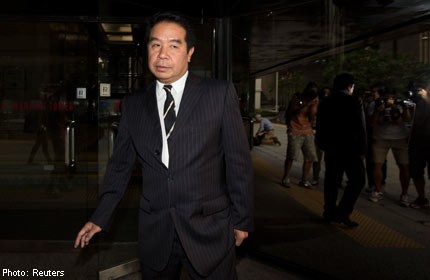Football: Birmingham owner denies 'dirty money' link


HONG KONG - Birmingham City owner Carson Yeung said he amassed his wealth through stock-trading and gambling but denied dealing with triads, as he testified in his US$93 million (S$115 million) money-laundering trial in Hong Kong.
The hairdresser-turned-football tycoon from the southern Chinese city was arrested in June 2011 over allegedly dealing in ill-gotten gains worth tens of millions of dollars.
The high-profile yet oft-delayed case has put Yeung's wealth under an intense spotlight, as he faced questions about his spectacular rise from hairdresser to owner of an English football club.
The court heard Thursday that Yeung had invested HK$40 million ($5 million) in a local film company for the movie "Killzone" in 2005 with winnings from gambling in nearby Macau. "It was the accumulation from several winnings," Yeung said.
But the movie, starring martial arts stars Donnie Yen and Sammo Hung, did not pass censors in China and the investment resulted in a loss, he told the court.
"It did well in Hong Kong, however on the mainland, it could not pass censoring authorities... we lost on this big market."
Throughout his testimony, starting October 15, Yeung and the prosecution have painted differing pictures of how his wealth was amassed, with prosecutors claiming around HK$720 million had passed through his bank accounts.
Yeung has said he accumulated hundreds of millions of dollars through stock trading, hairdressing, business ventures in mainland China and gambling.
He said his stock portfolio in 2007 was worth around HK$300 million dollars held in margin accounts with almost 40 stockbrokers, adding that he spent "all my time" trading stocks after the 1998 Asian market crash.
He also set up business ventures in Inner Mongolia from 2001 to 2007 where he made large profits from fertiliser and real estate operations.
"I was the first person in Hong Kong to invest in Inner Mongolia," Yeung said.
Gambling activities in Macau also raked in HK$20 to HK$30 million in profits between 2004 and 2008, Yeung claimed, adding his preference was to play baccarat in the Neptune Club in gaming tycoon Stanley Ho's Hotel Lisboa.
"I gambled as if I were running a business," Yeung told the court.
But prosecutor John Reading said Yeung had "grossly exaggerated" his earnings and constantly grilled him on his relationship and dealings with Cheung Chi-tai, an alleged triad boss.
"Did you know that Cheung Chi-tai was believed by police to be a member of a triad society?" Reading asked, to which Yeung replied: "I didn't know".
Yeung said Cheung, a major shareholder in gaming company Neptune Group Ltd., asked Yeung to invest in the company. Yeung invested HK$26.4million in a Neptune Club VIP room in the Hotel Lisboa in Macau in 2005.
When quizzed by Reading, he also said a payment of HK$18 million he received from Cheung in 2007 was a return from the investment in Neptune and that he used the money to buy property in London.
"I didn't ask him (where the money came from) because I knew him for many years, he was the second largest shareholder of Neptune Group," Yeung told the court, adding that he wasn't suspicious of the HK$18 million's origin.
When Reading asked if any of Yeung's proceeds were ill-gotten, he replied: "There were none...it was my money."
And when asked if he had used dirty money to purchase a stake in Birmingham City Football Club, Yeung said: "It was impossible".
The court also heard that Yeung spent lavishly, blowing HK$6 million on a Maybach car, HK$49 million on an 88 foot (27 metre) yacht along with a five million pound (US$8 million) property in London.
Yeung, who was little-known prior to his emergence in English football, took control of Birmingham City in October 2009 in an 81 million pound takeover from David Sullivan and David Gold, now the co-owners of West Ham.
Birmingham City's fortunes have gone downhill since then. They were relegated from the Premier League in 2011, three months after winning the League Cup.
The court is expected to hand down a verdict next year.